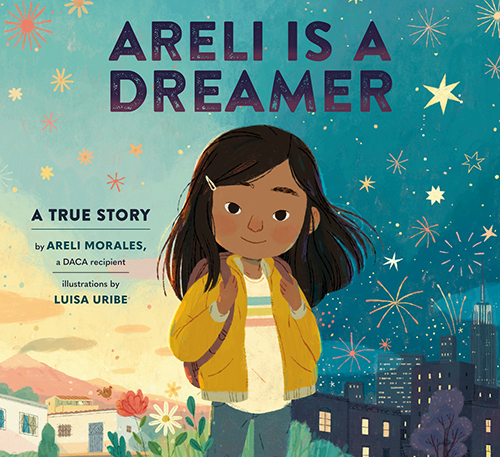What does it feel like to never see your own story reflected in the books you read? Areli Morales wanted to provide a space for kids who are undocumented to feel seen and understood. In today’s guest post on the Mackin Community Blog, she shares the inspiration behind her picture book, Areli Is a Dreamer.
 Sacrifice is often the word we use when we describe the immigrant experience. My parents sacrificed so many things to pursue the American dream. Their sacrifices ultimately gave me the luxury to pursue my own dreams. But despite all their sacrifices and unconditional love, my parents could not shield me from the loneliness that came with growing up undocumented. I did not have any childhood friends who could relate to my experience, nor books that reaffirmed my existence.
Sacrifice is often the word we use when we describe the immigrant experience. My parents sacrificed so many things to pursue the American dream. Their sacrifices ultimately gave me the luxury to pursue my own dreams. But despite all their sacrifices and unconditional love, my parents could not shield me from the loneliness that came with growing up undocumented. I did not have any childhood friends who could relate to my experience, nor books that reaffirmed my existence.
As I became fully aware of my undocumented status, I was struck with fear when I realized that everything could be taken away at any moment if I spoke about my first home. Fear drove me to keep my story a secret for many years. Little did I know that years later, I would break free from that fear and silence by writing a picture book about my story.
Today, I am what we call “DACAmented,” which means I’m protected from deportation by the Deferred Action for Childhood Arrivals (DACA) program. The DACA program is a temporary immigration policy that has provided some relief to thousands of “Dreamers” like me who came here as children and call this country their home. After my DACA application was approved, I finally felt ready to come out of the shadows and tell my story. I reflected on how alone and scared I felt when I was young, and then realized that there were children currently living with those feelings who needed their experiences validated in a book. I wrote Areli Is a Dreamer so immigrant children would know that they are not alone in their journey and that they, too, will thrive despite the adversity.
When Areli Is a Dreamer was released in June 2021, I was joyfully overwhelmed with the positive reaction to and impact of the book. It finally dawned on me that my personal story was resonating with people of all ages and backgrounds, not just children. Strangers from all parts of the country reached out to me to share their own stories as well as how the book helped them understand my experience. My ability to share my story with the world helped me overcome loneliness, and gifted me the power to connect with others.
It has been exciting and affirming to connect with young readers via virtual author visits (fingers crossed that I will meet readers in real life soon). Through these virtual interactions, I’ve engaged in wonderful, powerful conversations that affirmed the idea that children are more than capable of understanding and discussing complex issues like immigration. As an educator, I strongly believe it’s not our job to tell kids what to think, but it is our responsibility to provide a safe space to talk about these complicated topics and provide them with the resources they need to develop their own opinions.
As Rudine Sims Bishop said, books can act as mirrors and windows; they can reflect our own story or offer insight into someone else’s experience. During my author visits, some children shared that my story reflected something from their own lives. They shared the difficult emotions of adjusting to a new country, a new school, and a new home. They, too, endured bullying from peers, the struggles and joys of learning a new language, and the pain of family separation. It was humbling to witness people become storytellers of their truth. Older Dreamers shared that they finally found a book that could help them share their stories with their own children, siblings, or even students. The optimistic and hopeful ending of the book also reminded them of their potential to do incredible things.
Like a window that a traveler looks through along their journey, books allow us access to views we haven’t seen before, and these perspectives can help us understand people who have very different stories from our own. In my virtual visits, children ask important questions about immigration. They wonder why families leave their home countries and embark on dangerous journeys to make a foreign land their new home. Most important, they discuss ways to be kinder and more welcoming to newcomers. Sharing authentic stories like my own can help us teach our kids about empathy, kindness, and acceptance; qualities that we desperately need in our current climate.
Although this book was written for a young audience, I also wrote and dedicated this book to all Dreamers: DACA recipients, undocumented people, and those younger and older than me who did not see the representation in books they eagerly desired and deserved.
When I connect with readers now, I no longer feel alone in my journey. Their words serve as evidence that stories like mine are important and necessary. The messages I receive from readers prove that through storytelling, we can break down those walls that make us feel isolated and start building bridges to reach those in our communities.






